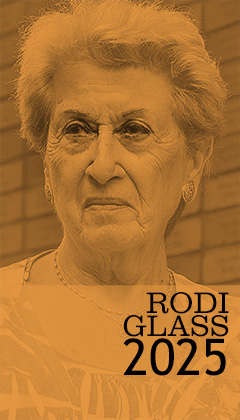
The Thaler Holocaust Education Trust welcomed Rodi Glass to Eastern Iowa in April 2025. Rodi spoke via Zoom at Mt. Mercy University, Cornell College, and at two area High Schools.
Rodi Waterman Glass was born into a large family in Amsterdam in 1936. They lived in London until Rodi’s mother was 16, when they returned to Amsterdam. By the time Rodi was born in 1936, her grandfather owned two stores and a wholesale shop.
When Rodi was just 4 years old, Germany invaded the Netherlands, including Amsterdam. “I still remember them marching in. We weren’t allowed to go out or stand out. We had to put shades down, but we peeked out and I can still, in my mind, hear the marching of the boots goose-stepping down the street.” Life changed after that. All Jews in the Netherlands had to register their names and addresses. Germans then started issuing a series of rules and laws including curfews and restricting Jews’ ability to have money or other valuables, attend school, or be in public spaces.
In September 1942, the Dutch police came to Rodi’s home late at night and told her family they needed to leave. They were sent to Westerbork transit camp. Through familial connections, Rodi’s family was able to escape deportation twice.
Rodi and her family realized that most of her father’s family had been taken away and killed. From May to September 1943, the Nazis sealed the Jewish quarter of Amsterdam and rounded up Jews for deportation. Rodi’s family was sent to Westerbork again. A familial connection once again helped the family to be sent to an internment camp in Vittel, France, instead of Bergen-Belsen. They remained in Vittel until it was liberated in September 1944.
When the Netherlands was liberated in May 1945, Rodi’s mother got approval for the family to return to Amsterdam. Upon arrival, they were given some money and placed in former orphanages. In Amsterdam, the family business was still operating under a Dutch Nazi sympathizer. Rodi’s father threw him out and they took back control of the business. While the family rebuilt the store and life returned to normal, her mother’s sisters moved to Chicago. In 1950, her aunts wrote a letter telling the family to come to the US, and in April 1951, Rodi, her parents, and grandparents arrived in New York, and then headed for Chicago.
Rodi went to Hyde Park High School and in 1955 married her husband, Marvin. The two were married for 62 years and have three children, six grandchildren, and four great grandchildren. “Life turned out beautiful for me. Luck played a big part in my life. I’ve been a very lucky person. Luck for surviving. Luck meeting the right people. Luck for having a beautiful family and wonderful friends.”
Many thanks to Iowa Public Radio and Dani Gehr for this interview with Rodi Glass.